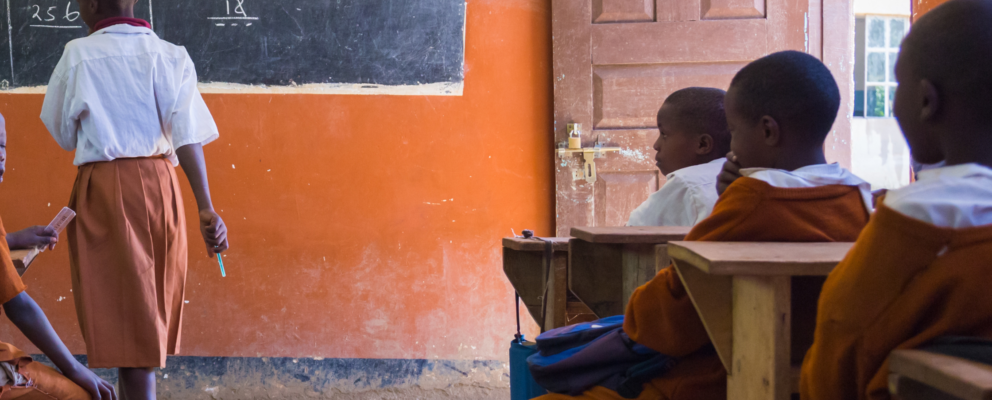Get involved and contribute to change
Every donation fosters innovations to end poverty and improve our world.
Skip to Navigation or Skip to Main Content

At Engineers Without Borders Canada, we believe in the power of engineering to drive social change and create a sustainable future. The Engineering Better Tomorrows (EBT) project embodies this vision by addressing energy poverty in Zambia and Malawi to help bridge energy access gaps in schools and health centers.
Our mission is to drive systemic and sustainable change through community-driven collaboration, through local community leaders, service providers, and organizations, and by leveraging technological advancements. Through the project, we are providing reliable solar energy solutions to meet the critical needs of rural health facilities and schools, and ensuring that local partners, including government ministries, are equipped to provide ongoing technical support.
By addressing education disparities for girls, EWB aims to increase access to quality education and provide a clearer path to post-secondary opportunities and employment. Sub-Saharan Africa has the highest rate of education exclusion, with 9 million girls and 6 million boys aged 6-11 never attending school (UIS), and those disadvantages for girls start early: 23% do not attend primary school, and by adolescence, that rises to 36%. This early exclusion is especially concerning because girls out of school are more likely to face abuse, child labor, and early pregnancies. Child marriages specifically drop by 64% after education opportunities and exclusion rates are enhanced for young women (GEM). On top of that, healthcare impacts on women and girls are significant, effectively represented in the example of a Ugandan rural health clinic study where electricity access dropped maternal deaths by 61%.
Access to reliable electricity at schools that currently lack it in the region would enable students and teachers to spend more time teaching and learning, and provide access to the internet. This can help with the development of online curricular plans, online teaching aids and testing. From a healthcare perspective, access to electricity enables facilities to utilize digital health technologies, which enhance health outcomes directly through better data management, better planning for patient treatment and follow-up, remote diagnostics and data analysis. According to Deloitte, life-saving digital health services could also contribute $2.2 trillion to GDP and create over 140 million new jobs.
Every donation fosters innovations to end poverty and improve our world.
50,000+ rural healthcare facilities within the region lack electricity (NIH). EBT addresses energy access gaps in health centers in Zambia and Malawi by providing reliable electricity for essential medical equipment, vaccine storage, and a safer environment for patients and healthcare providers. For example, one-third of child hospital admissions are anemic children, 50% of which do not survive beyond 8 hours due to poor or no (refrigerated) blood bank supply (WHO). This initiative brings life-saving improvements and enhances healthcare services in the region.
Electricity is essential for operating critical medical devices that significantly improve health outcomes. This includes oxygenators for oxygen therapy, centrifuges for blood tests, refrigerators and freezers for maintaining the cold chain for vaccines and medications, TB analyzers for diagnosing tuberculosis, ventilators for supporting severe respiratory patients, incubators for the care of premature infants, and sterilizers for ensuring medical instrument safety. Reliable electricity ensures these devices function continuously, vital for patient care and survival.
Providing electricity to health workers’ living quarters greatly enhances their quality of life, contributing to staff retention. Stable power supply enables comfortable living environments with lighting, heating, cooling, and household appliances, making conditions more bearable in remote areas. It also boosts job satisfaction by providing access to amenities and reliable facilities, reducing turnover rates.
Electricity enables essential maternal and newborn health services, significantly reducing mortality rates and improving health outcomes. Immediate access to hot water and permanent lighting ensures hygienic conditions during childbirth and postnatal care, reducing complications. Monitoring equipment, such as fetal heart rate monitors and ultrasounds, is critical for the health of both mother and baby during pregnancy and delivery. Incubators and warmers are essential for the survival and health of premature and low-birth-weight infants, maintaining body temperature and reducing mortality rates. In Uganda, facilities with reliable electricity saw a 61% drop in maternal deaths, while facilities that were given access to electricity in Zambia showed increased community use of maternal and child health services, including vaccinations. In fact, 70% of the total number of global maternal deaths occur in the region annually, according to the National Institute of Health, many of which are preventable via access to reliable energy and medical equipment.
In Zambia, only 25% of rural schools are electrified compared to 80% in urban areas. Similarly, in Malawi, just 20% of rural schools have access to electricity, while 75% of urban schools are electrified. The EBT project has the capacity to dramatically impact education outcomes by providing lighting for evening classes, internet access for educational technology, and empowering teachers. This leads to better test results, increased lifetime earnings, and improved educational opportunities for students.
Providing reliable electricity in schools significantly enhances working conditions for teachers by enabling the use of modern teaching aids, internet access, and comfortable amenities. Additionally, electricity facilitates continuous professional development through online courses and e-learning platforms, keeping teachers updated with the latest educational practices. A World Bank study shows that teachers with access to digital professional development programs are more likely to stay in their positions and perform better.
Electrification of schools creates a safer and more conducive learning environment, with adequate lighting allowing girls to attend evening classes and participate in after-school activities. In sub-Saharan Africa, the presence of electricity has significantly decreased the dropout rates of girls. Electricity also supports programs addressing barriers to girls’ education, such as early pregnancies and child marriages, by enabling initiatives like counseling and healthcare. Studies show that girls in safe, resource-rich environments are more likely to complete their schooling. More broadly, access to electricity improves academic performance through extended study hours and better use of educational technology, leading to higher pass rates. UNESCO research revealed how electrified schools in rural Africa saw a 20% increase in pass rates.
Electricity enables the use of e-learning and e-teaching tools that significantly improve education quality. Personalized software and adaptive technologies tailor instruction to each student’s level, enhancing learning outcomes. According to a World Bank report, the benefit-cost ratio for such interventions can be as high as 100:1. Additionally, structured pedagogy, which teaches according to learning levels rather than age or grade, ensures students receive instruction suited to their understanding, preventing them from falling behind. Studies found that this approach, supported by technology, can double learning gains.
Reliable lighting enables students to study in the evening, giving them additional time for homework and exam preparation, especially crucial for those with daytime chores or work. A UNICEF survey found that students in electrified rural schools could study up to three hours more per day. Teachers also benefit, as they can plan lessons and offer evening study sessions and extra classes, enhancing overall educational experiences. This extended support has been linked to a 15% increase in student performance in rural schools.
Learn more about the project here, by watching our latest webinar replay on EBT or by contacting us directly at info@ewb.ca.
Join us in making a difference.
